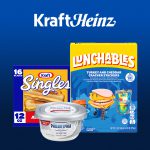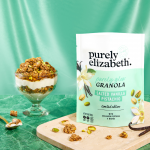Wilde Protein Chips Pumps Up With Muscular Investment

Wilde Brands has landed an eight-figure investment from previous backers and new investors who see a future for the protein snack brand to expand further in retail as it eyes international markets
The chicken chip maker announced today it had secured over $20 million in a round led by existing investors KarpReilly and Bill Moses that also included new investments from the Family Fund and performing artists Jack Harlow and Machine Gun Kelly.
Harlow and Kelly were brought into the round by venture studio Grey Space Group, which — along with making investments in brands like Wilde and Koia — bridges the gap between CPG brands and cultural entities like athletes and celebrities.
Wilde has taken a long and winding road to getting to where it’s at now.
Initially, Wilde Brands started by making meat snack bars but began its pivot into a crunchier protein delivery format in 2017 when it launched its chicken chips. Eventually discontinuing the bars and going through multiple packaging refreshes, founder and CEO Jason Wright finally landed on Wilde’s current branding and recipe made from chicken breast meat, egg whites and bone broth.
“I like the fact that we’re offering protein chips with real food,” Wright told Nosh. “Wilde gives the customer something totally different. We’re giving you a culinary experience and a flavor profile that you’re not gonna get with a powdered [protein] product.”
The brand has seven flavors (Nashville Hot, Chicken & Waffles, Buffalo, Barbeque, Salt & Vinegar, Himalayan Pink Salt and, its latest addition, Spicy Queso that all lean into the flavor profile of its hero ingredient while leaving plenty of room for new innovation.
Wright hinted that the brand is toying with Chamoy and Jalapeño Ranch varieties as well as another flavor launch in the works linked to a partnership with “the Holy Grail of chicken.”
Although consumer-friendly flavors might be driving adoption, growth is coming from the brand’s ability to reach shoppers in multiple channels and even in multiple store parts.
In the last year, sales picked up when Wilde expanded its distribution from natural channel stores like Whole Foods and Sprouts into mass and club partnerships with Target, Walmart and Costco. At Target, Wilde has placements in two categories: The four-packs of 1.34 oz. bags are in the Sports Nutrition set and are expanding into all 1,600 Target stores while its 2.25 oz. bags are in about 500 locations in the Alternative Snacking grocery category.
The brand is gearing up for a summer program in Costco that begins in June and will expand its footprint in the club chain’s warehouses. In total, WIlde is in about 20,000 doors including conventional retailers like Publix as well as online platforms like Gopuff and Amazon.
In an effort to “become a household name,” Wright said, the brand has also partnered with fitness events like Tough Mudder to build brand awareness.
Yet, the U.S. might not be the only place to run wild.
After recently returning from a trip to Germany to talk to equipment providers, Wright made a stop in Dubai to talk with a venture group about potentially bringing Wilde abroad. Along with Europe and the Middle East, the brand is looking north with ongoing conversations with Canadian retailers as well.
Though the plans are in their “very early stages,” Wright said that it has been a goal from the beginning “to prove that Wilde can be successful in another country.”
“Everything that you see here is happening there,” he said, referencing his time in Germany and Dubai. “People really want snacks that work for them, and protein is something that is filling and full of energy. All around it’s a better source than just 100% carbs.”
With some added capital, Wilde is well-positioned to dig deeper into that trend. The brand operates its own manufacturing plant in Lexington, Kentucky, and feels like it has the scale to expand both domestically as well as abroad.
For now, Wilde is focused on going deeper with its current retail partners but is watching how it can further differentiate itself from the other high-protein chips that are starting to fill out the snack set.
Competition is building with brands like ZeroCarb Lyfe bringing its own chicken-based protein chips to market last year. Quest Nutrition and Legendary Foods also have protein chips (both using milk protein isolate).
Although Wilde sees its use of animal protein as a differentiator in taste and texture from protein powder-based brands, Wright said more competition is not necessarily a bad thing when building a high-protein set out of the salty snack category.
“If you look at salty snacks right now it’s dominated by carbohydrates,” Wright said. “And I think: how many barbecue potato chips do you need?”

















